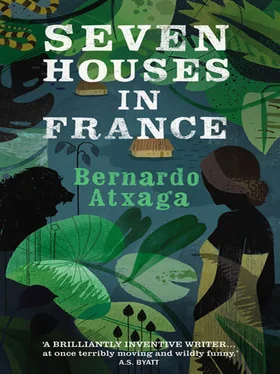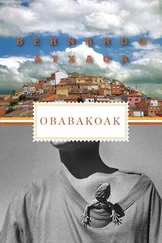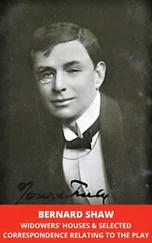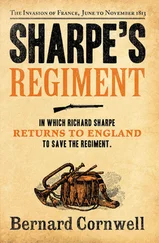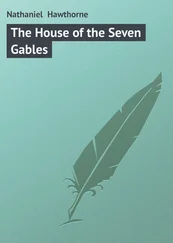‘It could be a trap set by the rebels.’
The boat got underway again, and Chrysostome came down from the roof.
‘As you know,’ Lassalle said to Richardson, having abandoned the idea of interviewing Chrysostome, ‘I’m writing a chronicle of the journey, and I will, of course, mention your baptism. Why that sudden decision to abandon Protestantism and convert to Catholicism? Why now and not before? You’ve had plenty of time in which to convert. You’re a veteran soldier, after all.’
Richardson burst out laughing and then led the journalist to a place where no one else could hear them.
‘I’ll tell you what happened, but you must tell no one else. You know Lopes, don’t you? He’s the young officer who was stationed in Angola before. Well, I don’t know if you’ve noticed, but he’s a real practical joker. He’s always playing tricks on people. Anyway, when we were up there, hearing mass, he positioned himself behind me. And when the bishop asked those who had not yet been baptised to step forward, Lopes gave me such a shove that I took not one but two steps forward. There was the bishop beaming away at me. What was I supposed to do? Take a step back? Disappoint him?’
Richardson laughed again, wagging his finger.
‘This story must go no further, mind.’
Lalande Biran was sitting in the prow of the boat, alone with Livo, and Lassalle’s journalistic instincts impelled him to join them. The two men stopped talking when they saw him approach.
‘You should definitely dedicate a few lines to Livo,’ Lalande Biran said. ‘Sometimes he thinks he has a brightness or a kind of vapour around him. Not like the steam coming out of the funnel on the boat, which is always white, but one that changes colour all the time. His oimbé — that’s what they call it — takes on a different colour depending on his mood.’
‘How interesting.’
And he wasn’t lying, because, as a journalist, he found everything interesting, but he knew that what really mattered was the thing they weren’t telling him.
‘Livo and I have something we need to talk about, Ferdinand,’ Lalande Biran said, thus confirming Lassalle’s suspicions. ‘We’ll be back in Yangambi soon and, if you like, you can ask him about that luminous vapour then.’
‘Of course. I’ll interview you later, Livo, if I may.’
Livo had scratches on his face and would not meet his gaze. It seemed to Lassalle that Livo could not even see him, as if the oimbé to which Lalande Biran had referred stood between them. He gave no reply.
‘Livo has some family problems, that’s why he’s looking so downcast,’ Lalande Biran explained. ‘The Twa are like that. If there’s anything worrying them, they lose all heart. He’s come to ask my advice.’
For the first time since he arrived, Lassalle felt like staying on in the Congo. His journalistic nose was telling him that there was some juicy bit of news there. What he had written so far wasn’t bad, and he was sure that European readers would find his article interesting, but it lacked that special something, the pinch of salt that would lift the story off the page and into after-dinner conversations. In his article about the Foreign Legion, the story about the ‘well-endowed soldier’ with four balls had served that purpose, and was doubtless the ‘pinch of salt’ that had led to him winning the prize.
‘I’d like to interview you in the Club Royal,’ he said to Livo.
‘It’s probably best if I tell you about it, Ferdinand,’ said Lalande Biran. ‘As you can see, our man here is not feeling too well. I’ll tell you tonight over supper, if you like.’
‘Or some other day. I’ve decided to stay on in Yangambi. I’ll leave on next week’s boat.’
He himself was surprised by what he had just said, but it was done now.
‘If you don’t mind, that is,’ he added.
The Captain’s blue-gold eyes took on a special intensity.
‘No,’ he said, ‘that’s an excellent idea.’
Lassalle gave a discreet bow and returned to the stern of the boat. He sat down where Chrysostome had been sitting. There was no sun now. Thick clouds covered most of the sky.
‘The most beautiful metaphor was provided by the statue of the Virgin,’ he read in his notebook. Then he re-read his other notes and crossed out the sentence saying: ‘Surprise: Richardson asks to be baptised.’
The words flowed easily from his pencil now, and he reckoned that he would finish the description of the ceremony on Samanga before they reached Yangambi. However, just then, the boat started to sway and rock, and when he looked up, he realised that they were already at the point where the two rivers met, and were manoeuvring into shore.
The Roi du Congo left the main part of the river and, after passing between two islets, advanced in the direction of the Club Royal and turned towards the jetty. Ten askaris were standing on the beach and some raised their rifles in salute.
Lalande Biran waited for the bishop so that they could disembark together, and the other members of the expedition followed one by one. The beach filled up with people, as always happened when a boat arrived. On that occasion, though, the excitement was more muted. The officers, the askaris , the newly baptised youths, all seemed exhausted. Besides, the Roi du Congo was not bringing with it, as it usually did, boxes of biscuits or salami, still less alcoholic drinks. Its cargo was, so to speak, a spiritual one. They had managed to install the Virgin in her place.
Livo was among the first off the boat. He stepped down with the help of an askari and walked very slowly towards the Club Royal, as if he barely had the strength to put one foot in front of the other. On his shoulder, hanging from the pole, were the three reed baskets.
The last to disembark was Chrysostome. Holding his rifle in one hand, he jumped onto the beach without even getting his boots wet.
L’énigme de Chrysostome Liège . There was definitely something strange about him. If what everyone said was true, how was it that such a vigorous young man had remained as virginal as the statue they had left on Samanga? He thought of a good opening sentence: ‘He’s like a cheetah, yet he moves through the world as shyly as a hedgehog.’ Not bad. However, as with all such enigmas, what mattered was its resolution.
CHRYSOSTOME HAD NEVER forgotten the words he heard as a child from the parish priest in Britancourt.
‘Cleanliness is the greatest of the virtues,’ the priest told the children after their chance meeting with a syphilitic man who lived in one of the caves near the village. ‘If a Christian keeps himself clean inside and out, he will develop an iron exterior that no enemy sword can penetrate.’
The priest was a lean man who, for many years, had worked as an army chaplain, and his forthright words made a great impression on them all. While the priest was speaking, it seemed to Chrysostome that he was looking at him in particular, as if addressing him directly. He felt proud of this, and that feeling of satisfaction only increased when the priest asked him to stay on after the talk.
‘I am not a prophet like Daniel, but I believe that one day you will be a soldier,’ the priest said. ‘Listen, Chrysostome, if you keep yourself clean, abstain from drink and tobacco, you will be an astonishing marksman, a rifleman comparable to those in Napoleon’s guard. You have amazed everyone with your extraordinarily sure aim with the sling, but if you want to be a real David and defeat the giant Goliath, then you must nurture that gift and encourage it to grow.’
The priest’s words found a sweet, warm, snug corner in Chrysostome’s heart, comparable, metaphorically speaking, to that found by birds’ eggs in their nest. Up until then, there had been nothing remarkable about his life apart from being poor and having no mother, for she had died shortly after he was born, and he felt like a nobody. Then suddenly, there was the priest predicting that he would be a rifleman as good as those in Napoleon’s guard!
Читать дальше
